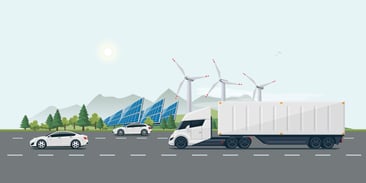Climate Change and the Impact on Inland Freight

Catastrophic “100-year floods,” devastating wildfires, massive hurricanes, and rising sea levels are just a few of the consequences the world is experiencing from climate change. This has made it a global concern because it impacts every person on Earth.
It has also prompted changes to the inland freight landscape because current and future expected environmental upheaval will affect transportation. Here are three changes you can expect to happen with the freight industry as climate change continues to reshape our planet.
Consumers’ Movement to Support Decrease in “Food Miles”
 People are more aware than ever of the effects of transportation emissions on the environment. This has spurred a global movement of buying food grown closer to home. More consumers are supporting local farms and stores that procure produce, meats, and other food products that are grown or produced locally.
People are more aware than ever of the effects of transportation emissions on the environment. This has spurred a global movement of buying food grown closer to home. More consumers are supporting local farms and stores that procure produce, meats, and other food products that are grown or produced locally.
This cuts down on the number of “food miles” from farm to plate, which normally is 750 miles for an average meal. It also means smaller shipments that do not necessarily require larger trucks for delivery.
Effects of Poor Weather Conditions
Flooding, snowstorms, and ice storms have become all too common across the United States. These storms make travel treacherous, and thus disrupts transportation routes. Shipping perishable produce is challenging enough without having to deal with delays caused by severe weather. Weather problems related to climate change continue to increase in intensity. This could lead to shippers reconfiguring transportation routes, which could increase the time and fuel needed to deliver shipments.
Another area to focus on severe weather is its destruction of crops. Flooding and droughts over recent years have cut into the available supply of produce, leading to increasingly sporadic inventories during peak shipping seasons. The inland freight industry is finding an increasing trend of reduced demand in previously steady markets.
Reduced Dependency on Fossil Fuels

The movement to reduce dependence on fossil fuels continues to grow domestically and across the globe. Transporting produce and other goods have always been resource-intensive. With caps being introduced, such as the new sulfur cap introduced by the International Maritime Organization (IMO) coming into force by 2020, ships will be required to cut sulfur emissions from 3.5 percent to 0.5 percent. This means ships will have to use fuel that is more refined, thus adding to fuel costs. These costs are likely to be passed along to shippers by way of fuel surcharges.
Technology could be the answer to this problem for international produce shipments, like ships that are powered by batteries and battery-powered engines, which has been explored in China and automaker Rolls Royce. However, in the short term, these solutions will take time and money, which makes it costly for smaller outfits. A faster solution may be better capacity management to increase load size to minimize shipments. However, this could also lead to shipping delays that could be critical with perishable products like produce. Combining shipments is a strategy that inland freight shippers can also adopt to minimize their impact on the environment.
Stay on Top of Market Changes that Impact the Industry
The battle against climate change is not going to be an easy one. Staying on top of market changes can be critical to your shipping activities. However, who has the time to spare from running their business?
Partnering with a trusted organization like Cargobot can help. We continuously stay on top of market changes to ensure industry success for our partners. This is done through working to:
- Increase efficiency
- Improve communications and shipment tracking
- Eliminate broker fees
- Hire qualified carriers
Learn more about how Cargobot is leading the way in helping inland freight go direct. Visit the Cargoblog to stay up to date with the latest in inland freight news, Learn more about the company at Cargobot Academy, or download the carrier app on iOS or Android.


